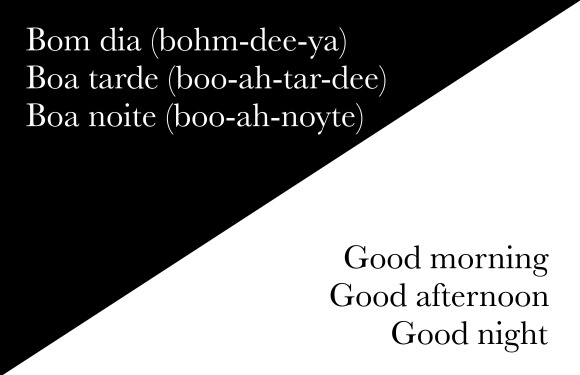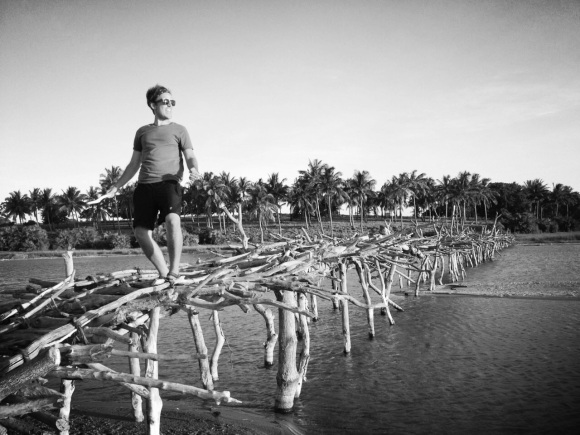While the language of Portuguese is obviously more intricate than a list of ten phrases, I’ve found myself using these phrases more than any other throughout the country. Call it survival Portuguese or small talk Portuguese, but these phrases are spoken more throughout the day because of how common it is to greet someone in passing or strike up a short conversation with a neighbor or friend.
- Bom dia (bohm-dee-ya) | Boa tarde (Boo-ah-tar-dee) | Boa noite (Boo-ah-noyte) = Good morning | Good afternoon | Good night
Seventy-five percent of the interactions I have with people in Mozambique simply involve these three phrases. When you’re passing someone in the street, it’s tradition to simply smile and use one of these three phrases depending on the time of day. While the first and second are easy enough to estimate (before and after noon, respectively), the latter is a hotly debated topic among volunteers and locals. When is the proper time to use “boa noite”? In my opinion (and from a conversation with my host mother), it’s after 6:00 p.m.; however, others will tell you it’s when it’s dark outside. The world may never know.
- Por favor (pour-fah-vor) | Obrigado/a (oh-bree-gah-doo/dah) = Please | Thank you
While the inclusion of these two phrases may seem like common sense, I’ve found that politeness is the one thing that can differentiate you (positively) from other Portuguese-attempters. In my experience, the former is used far less than the latter, but both are highly used and respected among locals. “Please” is simple enough to understand and used by everyone in the same way, but the use of “thank you” depends on the gender of the speaker. If you are male, you will use “obrigado.” If you are female, you will use “obrigada.” This never changes, so feel free to just forget the word for the opposite sex.
- Desculpe (desh-cool-puh) | Desculpe-me (desh-cool-puh-may) = Sorry | Excuse me
This is one that I’m starting to phase out of my vocabulary here in Mozambique. Back in the United States, I’m a constant sorry-er. Even when a sorry isn’t necessarily needed in the situation, I’m throwing them around like candy in a parade. However, the people in Mozambique are less likely to respond to a sorry with the same kind of empathy as in the states. Just as they tell us to walk tall and determined to avoid burglaries in urban areas, it’s necessary to be assertive in your speech in Mozambique to show strength, confidence. The latter (desculpe-me) is used when walking between people in a crowded market or trying to get someone’s attention. I think the general rule is to just not overuse either.
- Estamos juntos (Esh-tom-oosh-joon-toosh) = We are together
There’s potency in its brevity. When you first meet someone in Mozambique, it’s tradition to finish the conversation with this phrase. It’s already my favorite saying that I’ve learned, and I continue to search my brain for an American counterpart. Look forward to working with you? Happy to have you here? Welcome? While we might have a counterpart in English, there’s something stunning in the hopefulness about saying this phrase in Mozambique and genuinely feeling that you’re part of a growing country.
- Senhor (sen-your) | Chefe (chef-ee) | Boss (boss) = Sir | Boss | Boss
You would expect to use these three words with your supervisors at work (which you can, especially with Directors of Health or other high-ranking positions); however, in a country plagued by corruption, these words go a long way in protecting you from harassment from police officers and government officials. The country of Mozambique is all about respect. When you’re speaking to someone older or in a higher position, you’ll use a different verb tense to show admiration, formality.
When being harassed by a corrupt police officer to offer him or her a bribe, using “chefe” or “boss” will show that you know they are in control. While we all would rather tell them a different phrase with a little more sting, corruption belongs to a larger war outside our own efforts; however, it doesn’t mean you can’t calm the situation and win the battle, usually by just showing identification and saying you don’t have any money to offer.
- Não faz mal (now-fahz-mahl) | No problem!
Translating literally to “it means to harm” or “it does no harm,” this phrase is used often throughout the country in reply to someone saying sorry or excuse me. I like it, because it mirrors our own phrases such as “don’t worry about it” or “no problem.”
- Quanto custa? (Quan-too-coosh-tah?) = How much is it?
Knowing this phrase, as well as how to understand numbers in Portuguese and the value of Mozambican currency (30MT=$1), will help you get by in urban or rural areas when buying something from a market or vendor on the street. The difficulty is being overcharged because you’re a foreigner and they know you aren’t familiar with the pricings. A tip is to ask someone nearby how much the item is usually or having them ask the vendor.
- Bom apetite (bohm-ah-pay-teet) | Boa viagem (boo-ah-vee-ah-jem) | Have a nice meal | Have a nice trip
When eating with someone or a large group in Mozambique, it’s tradition to start the meal with this phrase, wishing the group a satisfying meal. We’ve all heard this used back in the states or throughout other parts of the world, but here it is a respectful and simple way of showing kindness to fellow travelers or Mozambicans. The second is used before any long trip or voyage to wish the traveler good luck.
- Chega (shay-gah) | I’m full!
Mozambicans are notorious for pushing more and more food out of respect for a visitor or foreigner, but the time comes when you’re so filled with rice, beans, and savory meats, that you simply have to tell them you’re full. Translating literally to “arrive,” the phrase lets your friends know that you couldn’t possibly eat another bite of food. You’ve arrived, or your belly has arrived, or a potential sleepy coma has arrived. Chega!
- Até já (ah-tay-jah) | See you soon
This is an informal phrase used to say goodbye to a close friend or colleague. While it doesn’t necessarily work in a more formal manner, it is used often throughout my community. Translating literally as “until already,” it doesn’t make literal sense, but it’s a phrase adopted to mean that the conversation will continue on.
Bonus Phrases that Incorporate English Words!
- Ta Nice! (tah-nice) = That’s nice!
- Estou biz (esh-toe-biz) = I am busy!
- Hello! (Hello) = Hello! (Was that one so hard?)
——————————————–
Questions? Comments? Need other phrases translated? Contact me!


